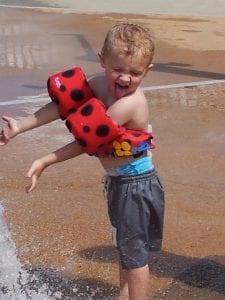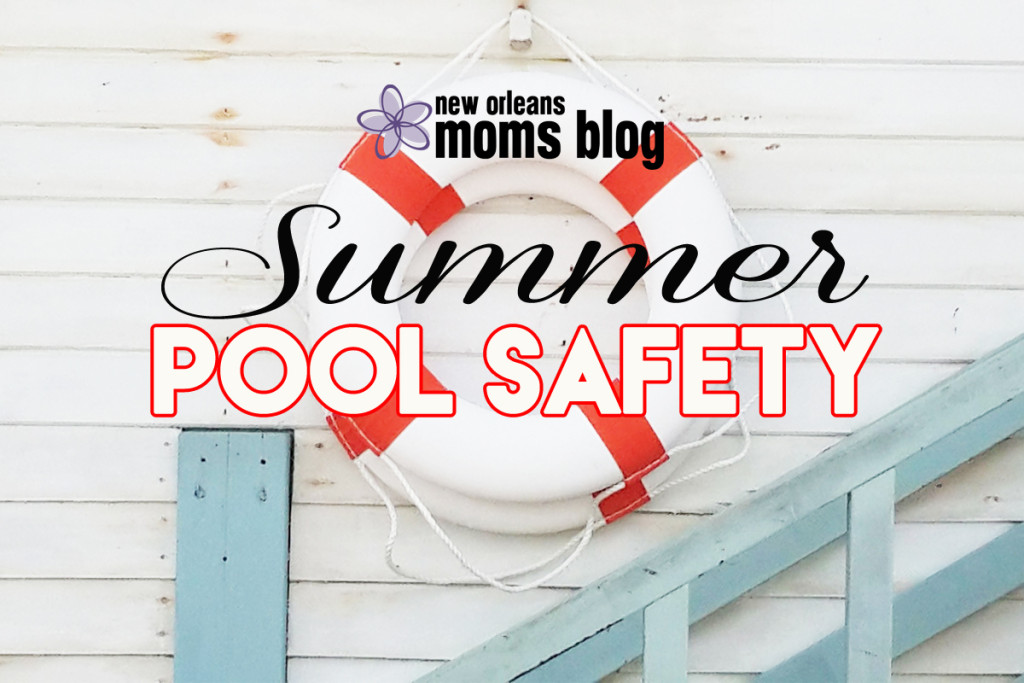 Fun in the sun with a splash of water is a must if you live in Louisiana. It seems around every corner there are pools, lakes, rivers, water parks, and many more ways to get your feet wet and beat the heat. Nothing is better than playing with your kids, soaking up some sun (go heavy on the sunscreen), and making fun memories splashing in the water. Playing in the water is great fun for kids and adults, but it is also a place where safety must come first. Drowning can occur quickly and quietly, wherever there is water. I’ve said it before and I will say it again, supervision is KEY to protecting our children from injury and deaths.
Fun in the sun with a splash of water is a must if you live in Louisiana. It seems around every corner there are pools, lakes, rivers, water parks, and many more ways to get your feet wet and beat the heat. Nothing is better than playing with your kids, soaking up some sun (go heavy on the sunscreen), and making fun memories splashing in the water. Playing in the water is great fun for kids and adults, but it is also a place where safety must come first. Drowning can occur quickly and quietly, wherever there is water. I’ve said it before and I will say it again, supervision is KEY to protecting our children from injury and deaths.
According to the Centers for Disease Control and Prevention (CDC), unintentional drowning claims approximately 10 people’s lives each day. Two out of ten occur to children age 14 or younger. Statistics from Safe Kids Worldwide show that, “drowning is the leading cause of injury-related death among children between 1 and 4 years old and it’s the third leading cause of death among children.” Knowledge and education about identifying risks and safety precautions are proven ways to prevent drowning injuries and deaths.
So, just where are these drowning deaths most likely to occur? According to Safe Kids Worldwide, when it comes to small children, ages 1-4 years old, swimming pools are the most common site for drowning deaths. Shockingly, 75% of pool submersion deaths occur at a home. If  you have a pool in your backyard, make sure there are proper barriers in place. A four-sided isolation fence (at least 4-5 feet high) with a self-closing and self-latching gate is one of the most effective ways to reduce the risk of children wandering into the pool area alone and unsupervised. For further protection, install a door and window alarm to alert you if a child wanders into the pool area.
you have a pool in your backyard, make sure there are proper barriers in place. A four-sided isolation fence (at least 4-5 feet high) with a self-closing and self-latching gate is one of the most effective ways to reduce the risk of children wandering into the pool area alone and unsupervised. For further protection, install a door and window alarm to alert you if a child wanders into the pool area.
Don’t overlook the dangers of inflatable pools. Yes, these pose a serious risk because of their low and flexible sides which makes it easier for a child to climb over. After using an inflatable/portable pool, it is best to empty them immediately after use and store them upside down.
If you are heading out on the boat for some recreational activities, be sure everyone has a U.S. Coast Guard-approved personal floatation device (PFD). It is estimated, half of all boating deaths might be prevented by actually wearing PFDs. In fact, Louisiana law requires that all children 16 years of age and younger wear a U.S. Coast Guard-approved PFD while underway on a vessel less than 26 feet long. No excuses, protect your children!
Take Steps To Reduce Risks:
- Active Supervision by an adult at all times. Never leave small children in a pool by themselves, it is best to be within an arm’s reach.
- Enroll your kids in swimming lessons to teach them basic water skills.
- Swimming aids should be considered toys and flotation devices should not be a substitute for supervision.
- Learn CPR. The more quickly CPR is started, the better the chance of improved outcomes. Both Touro Infirmary and Nurse Nikki offer CPR classes.
- Never assume someone else is watching a child in a pool area. Always have a designated adult outside at all times. Go to Water Watcher to print a card out for the person whose turn it is to watch children while playing in the water.
- Avoid alcohol while supervising children swimming.
- Check the drains in your pool or spa. Educate children about the dangers of drain entanglement/entrapment and teach them to never play or swim near drains or suction outlets.
- Teach young children to always swim with a buddy.
- If you have a swimming pool at home, remove floats, balls and other toys from the pool and surrounding area immediately after use so children are not tempted to enter the pool area unsupervised.
 Here is the good news: most of these deaths are both predictable and preventable. Take safety precautions and identify the risks. With that being said, NEVER leave a child unattended around water.
Here is the good news: most of these deaths are both predictable and preventable. Take safety precautions and identify the risks. With that being said, NEVER leave a child unattended around water.
ACTIVE supervision is essential to prevent drowning. There is no room for compromise, 100% of your attention should be focused on your children when they are near or around water because KIDS DON’T FLOAT!

















Good information. It’s also important to remember that drowning doesn’t look like drowning. https://mariovittone.com/2010/05/154/
Thank you for writing this, Janie! So important and true!!